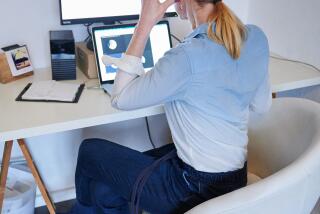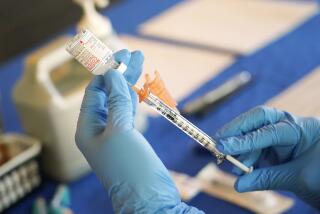Experts Urge Beefed-Up Exercise Policies : Health: Federal panel calls for new workplace, school rules that would allow for at least 30 minutes of physical activity a day.
- Share via
WASHINGTON — Warning that sitting around the house or office can be bad for your heart, a federal advisory panel Wednesday called for fundamental societal changes, such as new policies at work sites and in schools, that would enable all Americans, starting with young children, to get at least 30 minutes of exercise every day.
A panel of outside medical experts convened by the National Institutes of Health said studies have shown indisputably that regular physical activity can help stave off heart disease--the leading killer of men and women in this country--and related conditions that contribute to heart attacks and stroke, such as hypertension, obesity and high blood cholesterol. Physical activity also is related to increases in HDL, the so-called “good” cholesterol.
Furthermore, lack of exercise has been associated with other disorders, such as diabetes, osteoporosis and certain cancers.
Heart disease and stroke--the nation’s No. 3 killer--result in about 1 million deaths annually in the United States.
“We now are saying that physical activity is not just an individual responsibility but also a societal one,” said Dr. Suzanne Bennett Johnson, director of the Center for Pediatric Psychology Research at the University of Florida and a member of the panel.
Noting that increasing public policies on the national, state and local levels in recent years have had significant impact on smoking, another major risk factor for heart disease, she added: “We must do the same for physical activity.”
The panel said individual and societal factors have a strong influence on motivation and the ability to begin and maintain a fitness program. To that end, the group urged that schools and workplaces begin to offer “opportunities, reminders and rewards for doing so.”
On the job, for example, “an appropriate indoor area could be set aside to enable walking during lunch hours,” the panel report said. “Signs placed near elevators can encourage the use of the stairs instead. Discounts on parking fees could be offered to employees who elect to park in remote lots and walk.”
The panel called on schools to lay the foundation for a lifetime habit of fitness by scheduling physical activities for children daily, rather than at weekly or wider intervals. Such activities should “appeal to girls as well as boys,” and should be “enjoyable for children of all skill levels and not be limited to competitive sports,” the panel said.
The panel also recommended that physicians encourage patients to exercise, saying that “it is highly probable that people will be more likely to increase their physical activity if their health care provider counsels them to do so.”
Family and friends “can also be important sources of support for behavior change,” the panel said. The group recommended that spouses or friends serve as “buddies” by joining in on the physical activity. “Or a spouse could offer to take on a household task, giving his or her mate time to engage in physical activity,” the panel said.
Parents can support their children’s activities by “providing transportation, praise and encouragement,” they said.
Studies have shown that only about one out of four adults engage in regular exercise. An additional one-third of adults do not exercise enough to gain a “healthful level” of fitness, the panel said.
Also, as young children grow older, “girls become less active than boys, and children become far less active as they move through adolescence,” the panel said. Obesity is increasing among children, presumably related to lack of physical activity.
“At age 12, 70% report participation in vigorous physical activity, and by age 21 this activity falls to 42% for men and 30% for women,” the panel report said. “Furthermore, as adults age, their physical activity levels continue to decline.”
“The first step is the biggest step to cardiovascular health,” said Dr. Russell V. Luepker of the University of Minnesota School of Public Health, who served as chairman of the panel.
“More than half of adult Americans do not get enough physical activity and these are the very people who can gain the most by just getting started,” he said.
Those people who already exercise at least 30 minutes daily “may derive added benefit” by doing even more, the panel said.
More to Read
Sign up for Essential California
The most important California stories and recommendations in your inbox every morning.
You may occasionally receive promotional content from the Los Angeles Times.













